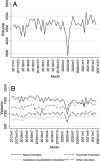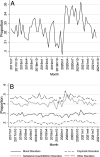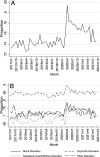Adult Psychiatric Hospitalizations in Ontario, Canada Before and During the COVID-19 Pandemic
- PMID: 37006178
- PMCID: PMC10657583
- DOI: 10.1177/07067437231167386
Adult Psychiatric Hospitalizations in Ontario, Canada Before and During the COVID-19 Pandemic
Abstract
Objective: The impacts of the COVID-19 pandemic on psychiatric hospitalizations in Ontario are unknown. The purpose of this study was to identify changes to volumes and characteristics of psychiatric hospitalizations in Ontario during the COVID-19 pandemic.
Methods: A time series analysis was done using psychiatric hospitalizations with admissions dates from July 2017 to September 2021 identified from provincial health administrative data. Variables included monthly volumes of hospitalizations as well as proportions of stays <3 days and involuntary admissions, overall and by diagnosis (mood, psychotic, addiction, and other disorders). Changes to trends during the pandemic were tested using linear regression.
Results: A total of 236,634 psychiatric hospitalizations were identified. Volumes decreased in the first few months of the pandemic before returning to prepandemic volumes by May 2020. However, monthly hospitalizations for psychotic disorders increased by ∼9% compared to the prepandemic period and remained elevated thereafter. Short stays and involuntary admissions increased by approximately 2% and 7%, respectively, before trending downwards.
Conclusion: Psychiatric hospitalizations quickly stabilized in response to the COVID-19 pandemic. However, evidence suggested a shift towards a more severe presentation during this period.
Objectif: Les répercussions de la pandémie de la COVID-19 sur les hospitalisations psychiatriques en Ontario ne sont pas connues. La présente étude a pour but d’identifier les changements des volumes et des caractéristiques des hospitalisations psychiatriques en Ontario durant la pandémie de la COVID-19.
Méthodes: Une analyse de séries chronologiques a été effectuée à l’aide des hospitalisations psychiatriques et des dates d’admission de juillet 2017 à septembre 2021, identifiées d’après les données administratives provinciales de la santé. Les variables comprenaient les volumes d’hospitalisation mensuels ainsi que les proportions des séjours de < 3 jours et les hospitalisations involontaires, en général et selon le diagnostic (troubles de l’humeur, psychotiques, de dépendance et autres). Les changements des tendances durant la pandémie ont été vérifiés à l’aide de la régression linéaire.
Résultats: 236 634 hospitalisations psychiatriques ont été identifiées. Les volumes ont diminué dans les premiers mois de la pandémie avant de revenir aux volumes pré-pandémiques en mai 2020. Cependant, les hospitalisations mensuelles pour des troubles psychotiques ont augmenté de ∼9% comparé à la période pré-pandémique et sont demeurées élevées par la suite. Les brefs séjours et les hospitalisations involontaires ont augmenté d’approximativement 2% et 7%, respectivement, avant de tendre vers le bas.
Conclusion: Les hospitalisations psychiatriques se sont rapidement stabilisées en réponse à la pandémie de la COVID-19. Toutefois, les données probantes ont suggéré une évolution vers une présentation plus grave durant cette période.
Keywords: COVID-19; mental health services; psychiatric hospitalizations.
Conflict of interest statement
Declaration of Conflicting InterestsThe authors declared no potential conflicts of interest with respect to the research, authorship, and/or publication of this article.
Figures



Similar articles
-
Acute mental health service use following onset of the COVID-19 pandemic in Ontario, Canada: a trend analysis.CMAJ Open. 2021 Nov 16;9(4):E988-E997. doi: 10.9778/cmajo.20210100. Print 2021 Oct-Dec. CMAJ Open. 2021. PMID: 34785528 Free PMC article.
-
Admissions for Bronchiolitis at Children's Hospitals Before and During the COVID-19 Pandemic.JAMA Netw Open. 2023 Oct 2;6(10):e2339884. doi: 10.1001/jamanetworkopen.2023.39884. JAMA Netw Open. 2023. PMID: 37883085 Free PMC article.
-
Hospitalizations During the COVID-19 Pandemic Among Recently Homeless Individuals: a Retrospective Population-Based Matched Cohort Study.J Gen Intern Med. 2022 Jun;37(8):2016-2025. doi: 10.1007/s11606-022-07506-4. Epub 2022 Apr 8. J Gen Intern Med. 2022. PMID: 35396658 Free PMC article.
-
A National Perspective on the Impact of the COVID-19 Pandemic on Heart Failure Hospitalizations in the United States.Curr Probl Cardiol. 2023 Sep;48(9):101749. doi: 10.1016/j.cpcardiol.2023.101749. Epub 2023 Apr 21. Curr Probl Cardiol. 2023. PMID: 37087079 Free PMC article. Review.
-
Challenges and Insights From Treating Psychotic Disorders During COVID-19 Pandemic in Brazil.Schizophr Bull Open. 2022 Sep 23;3(1):sgac061. doi: 10.1093/schizbullopen/sgac061. eCollection 2022 Jan. Schizophr Bull Open. 2022. PMID: 36348644 Free PMC article. Review.
Cited by
-
Adult psychiatric inpatient admissions and length of stay before and during the COVID-19 pandemic in a large urban hospital setting in Vancouver, British Columbia.Front Health Serv. 2024 May 14;4:1365785. doi: 10.3389/frhs.2024.1365785. eCollection 2024. Front Health Serv. 2024. PMID: 38807747 Free PMC article.
-
Patterns of psychiatric admissions across two major health crises: L' Aquila earthquake and COVID-19 pandemic lockdown.BMC Psychiatry. 2024 Oct 8;24(1):658. doi: 10.1186/s12888-024-06078-3. BMC Psychiatry. 2024. PMID: 39379917 Free PMC article.
-
Changes in psychiatric admissions in the first year of COVID-19 in Ontario, Canada.Int J Ment Health Syst. 2025 Jun 3;19(1):18. doi: 10.1186/s13033-025-00674-w. Int J Ment Health Syst. 2025. PMID: 40457388 Free PMC article.
-
Impact of the COVID-19 pandemic on adult mental health-related admissions at a large university health system in North Carolina - one year into the pandemic.PLoS One. 2023 Dec 21;18(12):e0293831. doi: 10.1371/journal.pone.0293831. eCollection 2023. PLoS One. 2023. PMID: 38127858 Free PMC article.
References
-
- Wong LE, Hawkins JE, Langness S, Murrel KL, Iris, P, Sammann A. Where are all the patients? Addressing COVID-19 fear to encourage sick patients to seek emergency care. NJEM Catalyst Innovations in Care Delivery. 2020.
Publication types
MeSH terms
LinkOut - more resources
Full Text Sources
Medical

